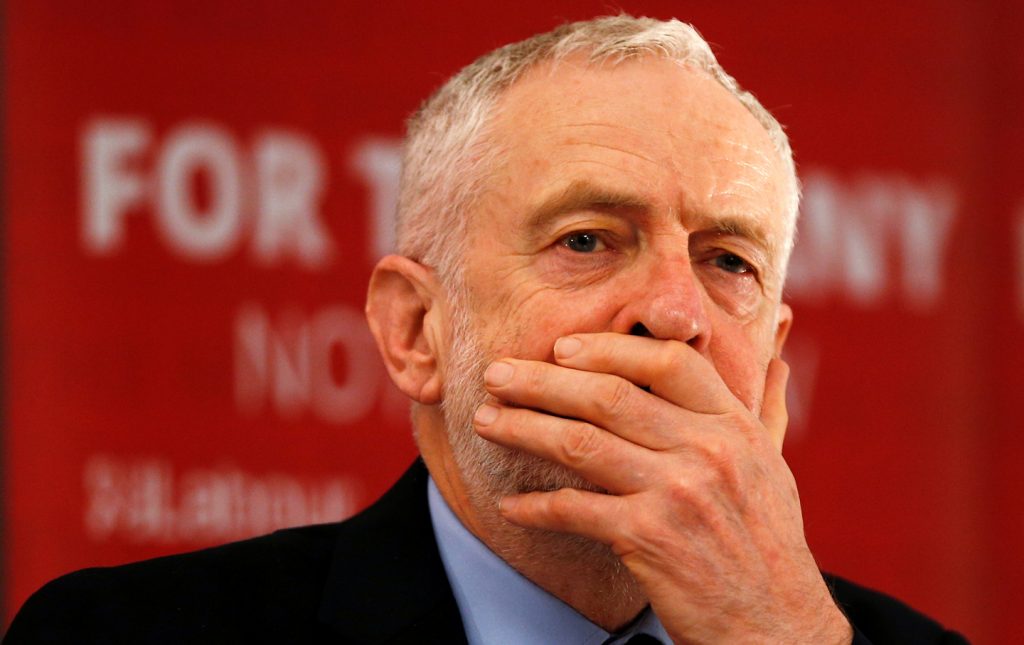Australia/Israel Review
Europa Europa: Corbyn’s nightmare
Apr 1, 2019 | Douglas Davis

Last month, the British Government-sponsored Equalities and Human Rights Commission announced that it was initiating an investigation into “a number of complaints regarding antisemitism in the Labour Party… We believe the party may have unlawfully discriminated against people because of their ethnicity and religious beliefs,” said a commission spokesperson. “Our concerns are sufficient for us to consider using our statutory enforcement powers.”
When British Labour Party leader Jeremy Corbyn is personally accused of antisemitism by members of his party, he looks hurt and sullen, before vigorously denouncing “all forms of racism” and proclaiming himself innocent of the charge.
Few believe him. They point to his warm relations with leading officials of Hamas and Hezbollah, to whom he refers as “friends”; his attendance at memorial services for slain Palestinian terrorist leaders; his refusal to visit Israel for a ceremony at the Yad Vashem Holocaust Memorial Centre; his attempt to change Holocaust Memorial Day to “Genocide Memorial Day” in order to dilute the specifically Jewish nature of the occasion, and, not least, his easy-going approach to the proliferation of antisemitism within his party.
What animates antisemitism on the far-left of the political spectrum? One acute political observer pointed out that Corbyn never quite grew out of the Stalinist ideology of the ’50s: “He sees the world in terms of global conspiracy theories, with Jews as the international agents of capitalism, imperialism and colonialism,” said a former colleague who was hounded out of the party by Jew-hating bullies.
It is no secret that Corbyn, a 30-year maverick of Labour’s backbenches, has somehow unleashed the chemical cocktail that created an eco-system in which antisemitism has been allowed to escape from the darkest recesses and flourish in the sewers that run through the villages, towns and cities of the British Isles.
Now, with Brexit tipping Britain into a state of almost permanent crisis, there is an even deeper concern: Jeremy Corbyn – anti-Western, anti-NATO, anti-monarchist – could become prime minister within a matter of weeks.
He has already promised that on his first day in power he will recognise a Palestinian state and freeze all British arms sales to Israel (never mind that Israeli military sales to Britain are far larger). If that is a taste of things to come, British Jews are justified in being concerned about their future in Britain.
Take three events last month that make British Jews skittish:
First was the decision of nine Labour parliamentarians to quit the party and form The Independent Group because of Corbyn’s failure to deal with antisemitism and halt the bullying of Jewish MPs.
Second was the speculation of Labour MP Ruth George that Israel might be secretly funding the group, a conspiracy theory for which she meekly apologised.
Third was Chris Williamson, a big-hitter from among the coterie of hard-left Labour legislators, who was suspended after a string of inflammatory outbursts. He supported antisemites who claimed there was a Zionist plan for world domination, and asserted that Jews were responsible for the African slave trade. But it was only after he complained that the party had been “too apologetic” over antisemitism that he was finally suspended – an act which Corbyn reportedly tried to block (he is said to have retreated only when furious non-Corbynistas on his front bench threatened to resign).
It is not only British Jews who are troubled by the Labour leader. George Carey, the former archbishop of Canterbury, said Corbyn gives the impression that he dislikes Jews and urged Labour Party members to do more to tackle antisemitism in their ranks.
But if British Jews have cause for concern about Corbyn, Israel does not, aside from its abiding concern for Jews in distress.
In a month when Israel launched a probe to the moon and the Bloomberg Index ranked Israel fifth on its list of most innovative countries in the world (after South Korea, Japan, Germany and Finland), Israel announced that its start-ups chalked up record investments of US$6.4 billion last year.
Little wonder that the Jewish state last month signed a free-trade deal with Britain that will take effect immediately after Brexit. Anglo-Israel trade already stands at a healthy, and growing, US$10 billion a year. British International Trade Secretary Liam Fox noted that Britain’s relationship with Israel is “stronger than it has ever been… record levels of bilateral co-operation in trade and investment”.
It is the stuff of nightmares for Jeremy Corbyn.
Tags: Antisemitism, United Kingdom






